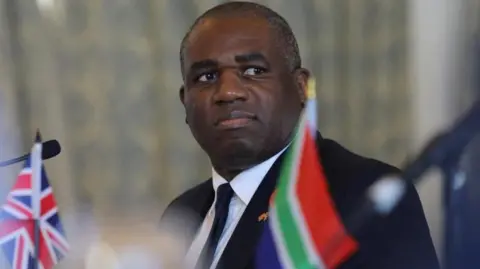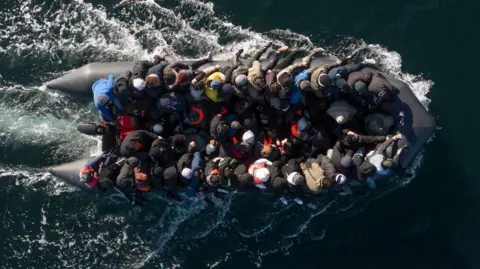UK shifts from 'big brother' approach to showing Africa more respect
 ReutersUK Foreign Secretary David Lammy is coming to the end of his maiden tour of Africa with the aim of resetting relations with the 54-nation continent. "Our new approach will deliver respectful partnerships that listen rather than tell, deliver long-term growth rather than short-term solutions and build a freer, safer, more prosperous continent," he said as he set out the agenda for his trip to the continent's two biggest powers - Nigeria and South Africa. Lammy's visit follows his appointment as foreign secretary in the Labour government that took office earlier this year - and was the first by a UK foreign secretary to the continent since 2013. Since then, relations between African states and other world powers have changed massively. Today, China is the largest trade partner for many African countries, while Russia has increasingly made inroads, including by offering military support to West African states battling jihadists. Oil-rich Gulf nations, along with Turkey, have also been increasing their influence on the continent by striking business and military deals.In contrast, UK-Africa relations have been "a lot more lacklustre", says Alex Vines, the head of the Africa programme at Chatham House, a London-based think tank.This is particularly the case between the UK and its biggest trading partner on the continent, South Africa, and the trip is an "attempt to reboot that", he adds. "I want to hear what our African partners need and foster relationships so that the UK and our friends and partners in Africa can grow together," Lammy said.Britain is no newcomer to the continent. A long – and at times chequered – history underpins many of its relationships with African countries.Almost all its former colonies on the continent are part of the Commonwealth, although countries that did not have this historical link to the UK have joined the group, including Rwanda, Togo and Gabon. Angola has also applied to join."The Commonwealth will likely continue to be a key platform," says Nicole Breadsworth, an academic at South Africa's Wits University.As its former colonies gained independence in the middle of the last century, Britain continued to play a sort of "big brother" role.But this is now changing.Dr Vines says Africa did not feature significantly in a major document released last year to outline the UK's priorities on the global stage."There were name checks to countries like Nigeria and South Africa and Kenya in it, but there wasn't much written," he says.Dr Vines adds that he expects South Africa-UK relations to improve under Labour because of its historic ties with the anti-apartheid movement that fought white-minority rule. "That comes from the anti-apartheid struggle and the solidarity that Labour and people that were the Labour movement provided for combating apartheid," he says.Dr Breadsworth, however, notes that former Conservative Prime Minister Theresa May tried to bolster ties with Africa, but her efforts were "scuppered" after she resigned in 2019 following turmoil in the then governing party. The UK then had an unprecedented turnover of prime ministers who had to deal with domestic crises, the UK's withdrawal from the European Union, and the Covid pandemic. "Africa fell off the radar," Dr Breadsworth says, adding that the exception was the controversial, and now-scrapped, deal to send some asylum seekers from the UK to Rwanda.
ReutersUK Foreign Secretary David Lammy is coming to the end of his maiden tour of Africa with the aim of resetting relations with the 54-nation continent. "Our new approach will deliver respectful partnerships that listen rather than tell, deliver long-term growth rather than short-term solutions and build a freer, safer, more prosperous continent," he said as he set out the agenda for his trip to the continent's two biggest powers - Nigeria and South Africa. Lammy's visit follows his appointment as foreign secretary in the Labour government that took office earlier this year - and was the first by a UK foreign secretary to the continent since 2013. Since then, relations between African states and other world powers have changed massively. Today, China is the largest trade partner for many African countries, while Russia has increasingly made inroads, including by offering military support to West African states battling jihadists. Oil-rich Gulf nations, along with Turkey, have also been increasing their influence on the continent by striking business and military deals.In contrast, UK-Africa relations have been "a lot more lacklustre", says Alex Vines, the head of the Africa programme at Chatham House, a London-based think tank.This is particularly the case between the UK and its biggest trading partner on the continent, South Africa, and the trip is an "attempt to reboot that", he adds. "I want to hear what our African partners need and foster relationships so that the UK and our friends and partners in Africa can grow together," Lammy said.Britain is no newcomer to the continent. A long – and at times chequered – history underpins many of its relationships with African countries.Almost all its former colonies on the continent are part of the Commonwealth, although countries that did not have this historical link to the UK have joined the group, including Rwanda, Togo and Gabon. Angola has also applied to join."The Commonwealth will likely continue to be a key platform," says Nicole Breadsworth, an academic at South Africa's Wits University.As its former colonies gained independence in the middle of the last century, Britain continued to play a sort of "big brother" role.But this is now changing.Dr Vines says Africa did not feature significantly in a major document released last year to outline the UK's priorities on the global stage."There were name checks to countries like Nigeria and South Africa and Kenya in it, but there wasn't much written," he says.Dr Vines adds that he expects South Africa-UK relations to improve under Labour because of its historic ties with the anti-apartheid movement that fought white-minority rule. "That comes from the anti-apartheid struggle and the solidarity that Labour and people that were the Labour movement provided for combating apartheid," he says.Dr Breadsworth, however, notes that former Conservative Prime Minister Theresa May tried to bolster ties with Africa, but her efforts were "scuppered" after she resigned in 2019 following turmoil in the then governing party. The UK then had an unprecedented turnover of prime ministers who had to deal with domestic crises, the UK's withdrawal from the European Union, and the Covid pandemic. "Africa fell off the radar," Dr Breadsworth says, adding that the exception was the controversial, and now-scrapped, deal to send some asylum seekers from the UK to Rwanda.  Getty ImagesIllegal migration to the UK has become a political hot potatoBeing the world’s youngest continent – with a median age of 19 – Africa presents opportunities for the future, the UK Foreign Office said."Africa has huge growth potential, with the continent on track to make up 25% of the world’s population by 2050," read a statement from the office.With an ageing population in the UK - as with much of the developed world - Dr Vines says that the sharing of skills will increase.He adds that migration is an "emotive and complicated issue", but the UK and other Western nations should avoid "cherry-picking the best and corroding African states from being successful themselves". The UK Foreign Office said that "growth is the core mission of this government and will underpin our relationships in Nigeria, South Africa and beyond". That will mean "more jobs and more opportunities for Brits and Africans alike," it added. The UK's Africa policy has long focused on development aid, but this has been slashed in recent years as the country faces its own economic crisis. Dr Vines says aid can be important to deal with humanitarian crises, climate shocks and to finance projects aimed at expanding the private sector in Africa, but he does not see the Labour government increasing funding."When you had a previous Labour government under Tony Blair, Britain saw itself as a global superpower for international development - that’s no longer the case," he says.Dr Breadsworth says relations are expected to move towards being more economically focused, and "much more mutually beneficial".She says this could also see the normalisation of the UK's relations with Zimbabwe and Harare being welcomed back to the Commonwealth after relations broke down during the rule of the late Robert Mugabe.Differences over international affairs such as the wars in Ukraine and the Middle East could also play out less in the public.South Africa’s position on both conflicts has been at odds with much of the West. But South African analyst Yanga Molotana does not see this as a major problem."Two things can exist at the same time - I can still hold my position, I can still hold my views, and we can still have a mutually beneficial relationship without the moral pressure of you saying that I have to agree with everything that you say," she adds.Dr Vines agrees, saying he expects the UK to continue promoting multi-party democracy in Africa, but there will be "less finger-wagging, and more quiet diplomacy". "The concern is probably going to be more regularly raised in private," he says.You may also be interested in:What form could reparations for slavery take?China's mission to win African hearts with satellite TVWar ‘tour’, football and graffiti: How Russia is trying to influence Africa
Getty ImagesIllegal migration to the UK has become a political hot potatoBeing the world’s youngest continent – with a median age of 19 – Africa presents opportunities for the future, the UK Foreign Office said."Africa has huge growth potential, with the continent on track to make up 25% of the world’s population by 2050," read a statement from the office.With an ageing population in the UK - as with much of the developed world - Dr Vines says that the sharing of skills will increase.He adds that migration is an "emotive and complicated issue", but the UK and other Western nations should avoid "cherry-picking the best and corroding African states from being successful themselves". The UK Foreign Office said that "growth is the core mission of this government and will underpin our relationships in Nigeria, South Africa and beyond". That will mean "more jobs and more opportunities for Brits and Africans alike," it added. The UK's Africa policy has long focused on development aid, but this has been slashed in recent years as the country faces its own economic crisis. Dr Vines says aid can be important to deal with humanitarian crises, climate shocks and to finance projects aimed at expanding the private sector in Africa, but he does not see the Labour government increasing funding."When you had a previous Labour government under Tony Blair, Britain saw itself as a global superpower for international development - that’s no longer the case," he says.Dr Breadsworth says relations are expected to move towards being more economically focused, and "much more mutually beneficial".She says this could also see the normalisation of the UK's relations with Zimbabwe and Harare being welcomed back to the Commonwealth after relations broke down during the rule of the late Robert Mugabe.Differences over international affairs such as the wars in Ukraine and the Middle East could also play out less in the public.South Africa’s position on both conflicts has been at odds with much of the West. But South African analyst Yanga Molotana does not see this as a major problem."Two things can exist at the same time - I can still hold my position, I can still hold my views, and we can still have a mutually beneficial relationship without the moral pressure of you saying that I have to agree with everything that you say," she adds.Dr Vines agrees, saying he expects the UK to continue promoting multi-party democracy in Africa, but there will be "less finger-wagging, and more quiet diplomacy". "The concern is probably going to be more regularly raised in private," he says.You may also be interested in:What form could reparations for slavery take?China's mission to win African hearts with satellite TVWar ‘tour’, football and graffiti: How Russia is trying to influence Africa Getty Images/BBCGo to BBCAfrica.com for more news from the African continent.Follow us on Twitter @BBCAfrica, on Facebook at BBC Africa or on Instagram at bbcafricaBBC Africa podcastsAfrica DailyFocus on Africa
Getty Images/BBCGo to BBCAfrica.com for more news from the African continent.Follow us on Twitter @BBCAfrica, on Facebook at BBC Africa or on Instagram at bbcafricaBBC Africa podcastsAfrica DailyFocus on Africa
发表评论






暂时没有评论,来抢沙发吧~